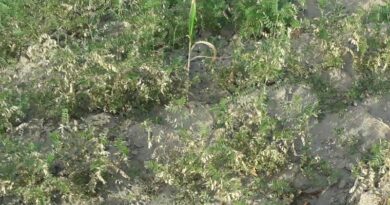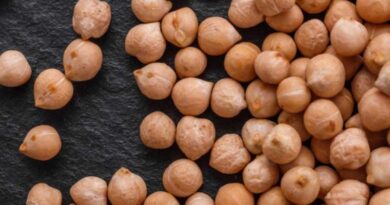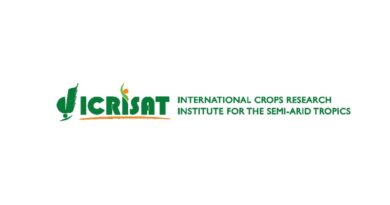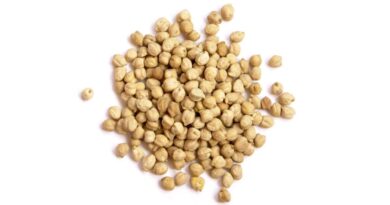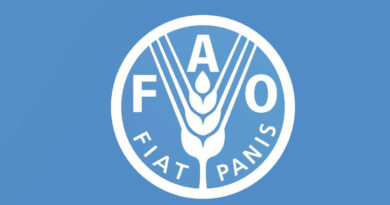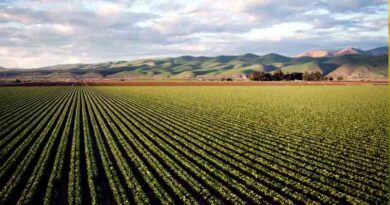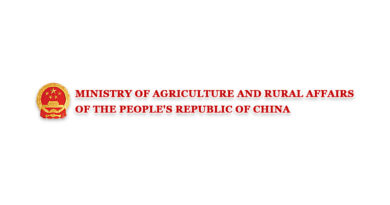Visit highlights progress for chickpea expansion in the West
23 November 2022, AU: Advancements in the development of chickpea varieties that are better adapted to Western Australia’s unique conditions have been identified during a recent visit to the state by Australia’s leading chickpea breeding researchers.
The project team from Chickpea Breeding Australia (CBA), a five-year $30 million partnership between the Grains Research and Development Corporation (GRDC) and the New South Wales Department of Primary Industries (NSW DPI), visited WA in September to visit key trial sites and inspect the progress of new breeding lines in development.
Dr Kristy Hobson, CBA’s senior chickpea breeder, says CBA has a bold plan to expand the breeding program’s scale approximately tenfold.
“Success will hinge upon accessing and integrating the best breeding technologies such as genomics and high-throughput phenotyping, as well as the latest in experimental design and data analytics,” Dr Hobson says.
WA’s chickpea production was almost decimated by a fungal outbreak of Ascochyta blight in the late 1990s, spread by the state’s dominant winter rains. Sixty thousand hectares of chickpea cropping was reduced to 5,000 hectares.
Dr Hobson says knowledge about the WA environment and farming systems is imperative to achieving CBA’s aims. It is also vital that selection for new chickpea varieties for WA grain growers is undertaken within the state and embedded within WA’s unique farming systems.
“To ensure new chickpea varieties are well-adapted to WA conditions, CBA has established six major chickpea evaluation and selection sites. We are substantially increasing the number of potential new varieties for WA,” Dr Hobson says.
Key traits that CBA is incorporating into chickpeas for WA grain growers are tolerance to aluminium and cold temperatures during flowering (chilling tolerance), together with tools to assist in managing weeds (herbicide tolerance) and resistance to important diseases.
“The program is focusing on high-yielding, disease-resistant, low-risk chickpea varieties with improved harvestability. Disease resistance, in particular Ascochyta blight resistance, is a critical component to minimising the risk of growing chickpeas.”
“While inspecting breeding trial sites at Dalwallinu, Mingenew, Cunderdin, Northampton and Merredin during the trip, the CBA breeding team was excited to see the promise and diversity in adaption within the CBA breeding material,” Dr Hobson says.
“CBA Captain (PBR) is the first desi chickpea released by CBA with improved adaptation to WA environments.
“It has a significant yield advantage over the most commonly grown variety while maintaining harvestability attributes sought by growers – that is, erect plant architecture and pods set high enough up the main stem to enable efficient harvest.”
The next release planned for WA grain growers is a variety with similar plant type to CBA Captain (PBR) but with improved resistance to Ascochyta blight.
Also in the pipeline is a CBA Captain (PBR)-related line with added herbicide tolerance, the original material was developed in a South Australian Research and Development Institute and GRDC project.
GRDC Manager – Pulses Francis Ogbonnaya says that WA grain growers are a key target for CBA and its collaborators.
“CBA is leveraging exciting progress in several chickpea focused research, development and extension projects. The program is collaborating with pre-breeders and agronomists, as well as the full variety delivery pipeline to achieve their goals,” Dr Ogbonnaya says.
“CBA is working towards ensuring that Western Australian growers have access to chickpea varieties that they can grow profitably and sustainably, given the importance of pulse crops not just in farming systems, but as a cash crop in their own right.”
This latest CBA progress is highlighted in a new video from GRDC titled ‘Expanding chickpeas in the West’ and the Groundcover online article ‘Partnerships galvanised by Chickpea Breeding Australia to deliver for WA’.
Also Read: Out of the Global Top 20 Pesticides, only 2 remain Patented: Study
(For Latest Agriculture News & Updates, follow Krishak Jagat on Google News)



